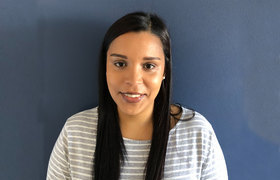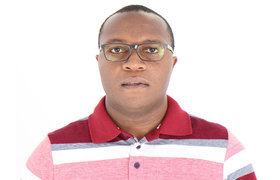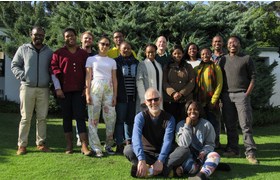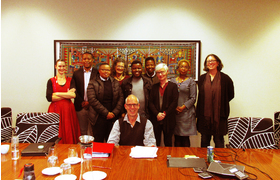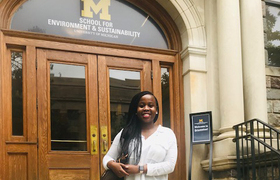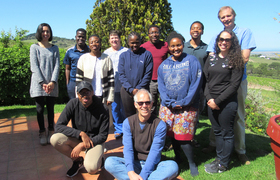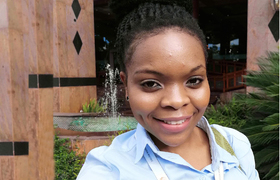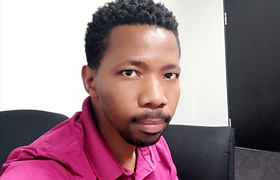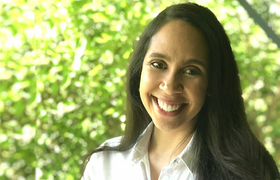Book launch inspires budding scientists
19 June 2018 | Story Supplied. Photos Gregor Leigh and Trisha Salagaram. Read time 3 min.
Hundreds of excited Khayelitsha learners enjoyed a science show as part of the launch of the isiXhosa translation of George’s Secret Key to the Universe – the children’s book by Lucy and Stephen Hawking. The translation was done by biliteracy expert Xolisa Guzula, a lecturer from the University of Cape Town (UCT) School of Education.

The book launch took place at Molo Mhlaba Primary School in Khayelitsha and kicked off with a song and dance routine by younger learners to welcome guests. Learners from surrounding schools attended and each were given a copy of the translated book, originally written by the father-and-daughter team of Stephen and Lucy Hawking.

The translator, Xolisa Guzula, introduced learners (aged 4 to 14) to the book before reading a few passages from it. Guzula was an avid reader herself as a child and the scarcity of isiXhosa books meant that she’d read far ahead of her age category. She now translates the sort of books she would have liked to read when she was younger.

After the reading, UCT lecturers Dr Trisha Salagaram and Gregor Leigh, and MSc student Lizelle Niit from the Faculty of Science treated learners to an interactive science show. Here Leigh demonstrates the effects of atmospheric pressure.

Lizelle Niit uses Bernoulli’s principle to float a ball in an air stream, to the amazement of learners. The host school, Molo Mhlaba Primary, has a strong emphasis on science and mathematics and is pleased to have established a link with the UCT Department of Physics.

Learners grapple with a Cartesian diver. This same enthusiasm inspired Guzula’s translation. Often learners struggle with science and mathematics, but she found that her son was excited about the Hawking cosmology series and was reading the titles voluntarily. If this series could get her child excited about science, she thought it could inspire others too.

Lizelle Niit demonstrates electrostatics using a Van de Graaff generator. Learners also witnessed a ball “floating” in an air stream, cans being crushed by nothing more than the atmosphere, home-made divers in water bottles which sank or rose in response to isiXhosa commands, and the launch of liquid nitrogen- and water-propelled rockets.

Gregor Leigh launching a liquid nitrogen rocket. He and his colleagues were invited to the launch by the Project for the Study of Alternative Education in South Africa, which Guzula has been working with since 2001. It is hoped that events like this will ignite a love of science in learners at an early age.
 This work is licensed under a Creative Commons Attribution-NoDerivatives 4.0 International License.
This work is licensed under a Creative Commons Attribution-NoDerivatives 4.0 International License.
Please view the republishing articles page for more information.
New Generation of Academics Programme (nGAP)
UCT has responded energetically to the New Generation of Academics Programme (nGAP), an opportunity provided by the Department of Higher Education (DHET) to build a new generation of black South African academics. The DHET’s 2015 vision document, “Staffing South Africa’s Universities Framework: A comprehensive, transformative approach to developing future generations of academics and building staff capacity”, proposes a suite of initiatives to address the challenge, with nGAP being the major instrument to increase the numbers of black South African academics.
The programme “involves the recruitment of highly capable scholars as new academics, against carefully designed and balanced equity considerations and in light of the disciplinary areas of greatest need”. The nGAP scholars are appointed into permanent positions where from the outset their conditions are customised to ensure their successful induction into the ranks of established academics.
The DHET provides funding over a six-year period to support the appointment of an nGAP lecturer, and their time is protected to provide the best possible opportunity for the completion of a doctorate degree in the shortest possible time. Once the degree is completed, the nGAP lecturer’s teaching commitments are steadily increased until they shoulder a full teaching load.
Since the first advertisement for nGAP posts in 2015, UCT has been awarded 17 nGAP positions: 5 (Phase 1), 4 (Phase 2), 3 (Phase 3) and 5 (Phase 4). These are distributed across all faculties.
UCT’s nGAP scholars operate as a single cohort, managed and coordinated by Dr Robert Morrell. Lecturers meet for quarterly meetings, writing retreats and various capacity-building activities all designed to support the completion of postgraduate qualifications (particularly doctorates) and to develop records of achievement that will testify to their emergence as self-standing, excellent academics. Each lecturer is mentored by a senior scholar, who provides support and guidance on the challenges that routinely face academics.
The nGAP manager sets great store in building the cohesion of the cohort and encouraging the establishment of new UCT networks while producing a collaborative, mutually supportive and embracing work culture.
According to Dr Morrell, “This group of academics will lead UCT in 15 to 20 years’ time ... Their vision of excellence, of being African and South African, of serving a wider community and producing knowledge for the planet, the continent and the country, will power UCT in years to come.”
Newsletters
In the news
